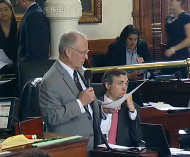4/23/2015
Illinois, Texas Advance Illusory Red Light Camera BansIllinois bill would affect less than ten percent of red light cameras. Texas would have even less impact.

Sixteen states ban photo enforcement (view list), but Illinois and Texas are not likely to join the list this year. Although measures that passed the Illinois House and Texas Senate yesterday are being advertised as "bans" on red light cameras, in practice they would do little to curb automated ticketing if they become law.
In Texas, the state Senate voted 22 to 8 to approve a bill that bans cities from signing new red light camera contracts -- something that cities nationwide have not been doing for the past two years. The bill that passed had been reshaped by camera advocates so that cities that currently use red light cameras could continue doing so indefinitely so long as they revise existing contract expiration dates before June.
"If before June 1, 2015, a local authority had enacted an ordinance under those provisions to implement a photographic traffic signal enforcement system and entered into a contract for the administration and enforcement of the system, the local authority may continue to operate the system under that ordinance and under the terms of that contract until the expiration date specified in the contract as the contract existed on June 1, 2015," Senate Bill 714 now states (view bill, 50k PDF).
In 2009, the last time the Texas legislature threatened to sunset the use of cameras, cities rushed to extend their contracts for up to twenty-five years. The way the bill was drafted deletes many provisions of existing law, including an existing ban on speed cameras, a prohibition on applying license points to tickets and a limitation on the fine amount to $75. A last minute amendment by state Senator Van Taylor (R-Plano) provides an exception for speed cameras as long as they are "actively operated and monitored on site by a law enforcement officer." Lawmakers did not acknowledge the limitations of their effort on Wednesday and instead spoke in broad terms about "banning" cameras.
"Many concepts which sound good on paper fail miserably in their real world application," state Senator Bob Hall (R-Van Zandt County) said. "The traffic camera is one of those concepts... It is clear that unmanned traffic cameras do not improve overall traffic safety."
The state Legislative Budget Board estimated that the bill as written would have netted lawmakers a total of $96,488,000 as undistributed trauma care proceeds from red light camera tickets would be deposited into the general fund, but another last-minute amendment restored the fund so that its fate could be debated as part of a more comprehensive discussion of statewide trust funds.
A similarly weakened red light camera measure passed the Illinois House on Wednesday by a vote of 79 to 26. What started as a complete ban on red light cameras was amended to exclude home rule towns.
"On or after January 1, 2017, no non-home rule unit within a county... may enact or continue to enforce an ordinance providing for an automated traffic law enforcement system to enforce violations of this code or a similar provision of a local ordinance," House Bill 173 states (view bill, 50k PDF).
Under this wording, only about fifty cameras would have to come down, compared to the 384 allowed to operate in Chicago alone. Of the 124 "home rule" cities in Illinois, many already have red light cameras and could keep them. Only a handful of tiny towns would be affected by the language, including: Algonquin (2 cameras), Bensenville (3 cameras), Blue Island, Forest Park, Franklin Park (2 cameras), Hometown (2 cameras), Homewood (4 cameras), Lake Zurich (3 cameras), Libertyville (3 cameras), Lisle (2 cameras), Lynwood (2 cameras), Markham, Olympia Fields (3 cameras), Palos Hills (2 cameras), River Forest (1 camera), Roselle (1 camera), Villa Park (3 cameras), Wauconda (2 cameras), Western Springs (2 cameras), Willowbrook (3 cameras), Winfield (1 camera) and Worth (2 cameras).
These home rule cities and villages could continue using red light cameras: Addison, Alsip, Aurora, Bedford Park, Bellwood, Berwyn, Calumet City, Carol Stream, Chicago, Cook County, Country Club Hills, Countryside, Des Plaines, East Dundee, East St. Louis, Elk Grove Village, Fox Lake, Granite City, Gurnee, Highland Park, Hoffman Estates, Lake in the Hills, Lincolnwood, Maywood, Melrose Park, Morton Grove, North Chicago, North Riverside, Northfield, Northlake, Oak Forest, Oak Lawn, Orland Park, Palatine, Palos Heights, Schiller Park, Skokie, South Holland, St. Charles, Streamwood, Tinley Park, Warrenville, Waukegan, Westchester and Wheeling.
The Illinois measure would have to clear the state Senate, and the Texas measure would have to be passed by the state House, before they could be signed into law by their respective state governors.


